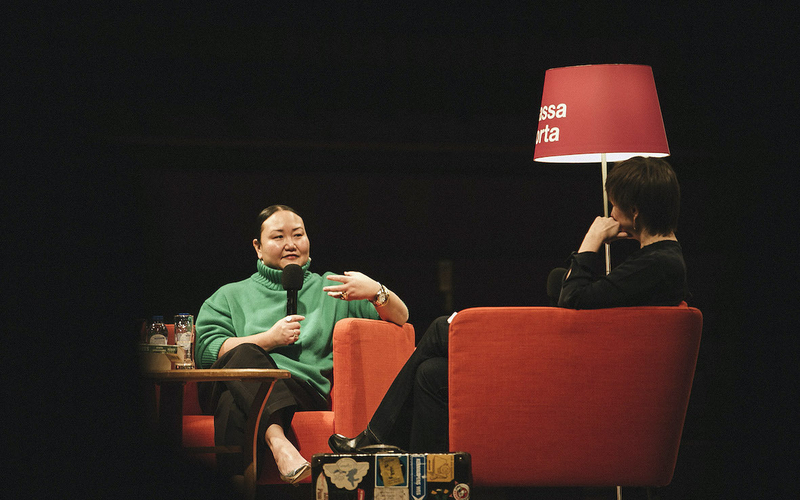video & afterthought: hanya yanagihara, insider-outsider

No fewer than six hundred book lovers attended the in-depth conversation between Hanya Yanagihara and Annelies Beck that took place at Flagey on 9 March. Among them was Mahdieh Fahimi. We asked her to write a personal commentary, which you can read below. You can also watch our complete recording of the evening.
‘I consider myself profoundly American.’ This is how Hanya Yanagihara began her detailed response to a question from journalist and writer Annelies Beck. The two were in conversation with one another at the invitation of the Brussels house of literature Passa Porta. The conversation took place under the watchful eye of myself among hundreds of other enthusiastic readers who filled the main hall at Flagey to the rafters. Five years after the overwhelming success of A Little Life, Yanagihara was here to present her latest novel.
What Annelies Beck asked her exactly escapes me now. It was something about the history of the United States, but that’s beside the point. It is Yanagihara’s statement that intrigues me. I wonder whether her Americanness has often been questioned. That would be the greatest contradiction in her existence. Born on one coast (Los Angeles) and blossoming professionally on the other (New York), she spent her childhood moving across the country. (Her father is an oncologist and often moved his family from city to city.) With ancestors from Korea and Hawaii, Yanagihara also represents two fundamental pillars of the American nation: a country formed by immigrants and enriched by colonization and slavery. The title of her latest book, To Paradise, as she herself explained, is therefore not so much a reference to the Bible as a purely American reference.
My thoughts wander to a review I read in The New Yorker. In it, the author asked whether To Paradise might be the next Great American Novel. It would be the first such novel by an Asian American woman and the first to feature homosexual characters. I thought this was an interesting reflection but hadn’t given it much thought. After all, Yanagihara is a master at describing life’s minute details. The doubts, fears and desires that her characters struggle with are universally recognizable. Beyond ethnicity and sexual orientation. Right?
But the more I listened to her, the more I realized that it would be an all too naive interpretation to confuse Yanagihara’s inclusive writing with neutrality. By depicting a fictionalized society in which the obstacles of colour and orientation have more or less faded, she put her finger on the sore points that are the foundation of virtually all problems in American society, including racism and homophobia. Yanagihara told the audience that a great many Americans do not travel abroad because the idea of having to leave their comfort zone scares them too much. That the ever-increasing pressure to succeed has created a system that causes children to fail in advance. That most Americans still nurse the idea that happiness is something you can achieve if only you try hard enough. If you don’t achieve happiness, you only have yourself to blame. The result is a society in which there is simply too little room for understanding ‘the other’.
The fact that Yanagihara creates characters who feel hopelessly lost, misunderstood and alienated in their quest makes me wonder whether she is not also talking about herself. That could very well explain her insider-outsider perspective. A critical view that you can only achieve if you look at something from the inside and the outside at once. ‘I want to rewrite history (and the future) to make it more inclusive’, she told the audience. ‘What if we as a society were more generous to all those who traditionally do not fit the norm?’
Photo: Caroline Lessire for Passa Porta
Mahdieh Fahimi (b. 1988) is an interpreter, translator and film journalist. Born in Belgium and raised in Iran, she is looking for a third home in her passion for film, theatre and literature.
